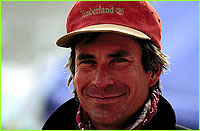 |
 Hear Breashears via RealAudio: 28.8 | ISDN |
 |
 Interview with David Breashears
Interview with David BreashearsExpedition Leader & Filmmaker Go to May 13, 1997 Interview NOVA: Why are you going back this time? Breashears: The most obvious reason to why I'm going back to Everest again is to make a film on high altitude physiology. It's a film I've wanted to make for a long time. I've always been interested in what happens to the human body at high altitudes and in particular what happens to the brain and how hypoxia impairs judgment and creative thinking—how one makes or doesn't make good decisions up high when you're functioning with twenty or thirty or forty percent of the oxygen available at sea level. After being on the mountain last year with the IMAX film team and seeing some very experienced climbers, namely Scott Fischer and Rob Hall, make some obviously poor decisions, I've become even more interested in making a film on high altitude physiology. A climber at high altitude is the last person to know that their thinking and thought processes are probably impaired. There's not an angel on your shoulder saying, "Knock, knock. Beware. You're not thinking clearly." You are in a totally subjective environment. There's no one objective observing you and looking out for you. So I'm very interested in how different levels of hypoxia affect different people in different ways. NOVA: Are you ever afraid on Everest? |
|
28.8 | ISDN |
Breashears: I wouldn't use fear as the word to characterize the way I normally feel when I climb Everest. But I would qualify that and say that last year after the tragedy happened and five people died on our side of the mountain, there was a certain amount of fear and a lot of it was mixed with sadness and the fear really emanated out of the fact that very strong experienced climbers had died. They were well equipped, they were climbing with oxygen, they ran into some bad weather—not probably the worst weather on Everest—and yet they both perished above Camp 4. So probably fear isn't the right word, it just made one feel more vulnerable. NOVA: Do you believe that you maintain sharp thinking, concentration & reasoning abilities to the top? or do these mental faculties slow? do you notice changes as they occur? | |
|
28.8 | ISDN |
Breashears: I've never noticed any changes in myself and that's because I'm a subjective observer of my own actions. You do notice that you're slower and that things are harder to do but if your brain is slightly impaired you certainly do not have the ability to say "I'm impaired"—just like a drunk driver will get into a car, turn on the keys, and off they go thinking they can negotiate turns and stop in sufficient time at red lights. But I'm acutely aware down lower of the fact that some mental faculties will be impaired up high along with your physical performance. So I have kind of a basic training approach to being up there which is you develop a set of responses to conditions that you adhere to and you don't deviate form those. You rely on the training you've given yourself down low to determine your actions up high. And that's a way of saying you're very robotic. NOVA: Do you think you've ever suffered any permanent mental or motor skill loss, even mild, from earlier climbs? | |
|
28.8 | ISDN |
Breashears: Once again, I've never noticed it and you can't notice those things about yourself. People's wives or girlfriends, people who really know the individual, have often commented on short term memory loss which is fully restored after a year. Motor skills tests would show reduced speed of, for example, finger tapping from prolonged exposure to altitude. But all these things are subtle. NOVA: Do the new 'electronic tethers' of having email and a live web site change the experience of climbing for you? | |
|
28.8 | ISDN |
Breashears: Having all these modern communications on the mountain (and they're only modern for us lay people, the military have had briefcase-sized satellite phones for probably 15 or 20 years) I can't say that having these things changes the experience at all in a negative way. The way it affected me last year was having someone sitting on the south summit dying from hypothermia and exposure and talking to his wife in New Zealand and I guess it made both of them feel better. I guess it was like being at his death bed and I guess she was, in essence, there from 10,000 miles away but I just found that to be almost from science fiction, it couldn't really be happening. But with our website it's always a thrill to know that all these school children and young people could learn about the mountain and experience it I guess vicariously. That's exciting because then you feel like you're doing a little bit more than just climbing a mountain. Go to May 13, 1997 interview with Breashears. Lost on Everest | High Exposure | Climb | History & Culture | Earth, Wind, & Ice E-mail | Previous Expeditions | Resources | Site Map | Everest Home Editor's Picks | Previous Sites | Join Us/E-mail | TV/Web Schedule About NOVA | Teachers | Site Map | Shop | Jobs | Search | To print PBS Online | NOVA Online | WGBH © | Updated November 2000 |
|